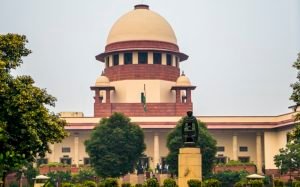The Supreme Court initiated a Suo Moto Writ Petition (Criminal) No. 1/2019 on 12.07.2019, taking cognisance of the “alarming rise in the number of reported child rape incidents” across India, based on various news reports. The Court requested Learned Senior Counsel Mr. V. Giri to assist as Amicus Curiae.
Initially, on 25.07.2019, the Court issued several directions to the Union of India and State Governments concerning the completion of investigations and trials of offences under the Protection of Children from Sexual Offences Act, 2012 (POCSO Act). These directions included setting up exclusive/designated POCSO Courts in districts with over 100 cases, with funding from the Central Government, and ensuring appointments of presiding officers, support persons, special public prosecutors, and court staff [2(i), 2(ii)]. It also directed that support persons be in sufficient numbers to manage the total cases [2(iii)]. Suggestions were also made for child abuse prevention awareness campaigns [3(v)].
Subsequent reports from the Amicus Curiae highlighted significant delays in investigations, filing of chargesheets, and obtaining Forensic Science Laboratory (FSL) reports. The Court then directed Directors of State Forensic Science Laboratories to ensure prompt and undelayed analysis and reporting of samples in POCSO cases4. Further directions involved the Union and State Governments ensuring timely investigation and trial within the POCSO Act’s timeframe, and sensitising officials. The Court later noted the large number of pending POCSO cases and laid down parameters for setting up exclusive POCSO Courts in states like Uttar Pradesh and West Bengal, where pendency was extremely high5. Concerns were also raised about inadequate public prosecutors and victim/witness security.
Law Involved
The core legal framework revolves around the Protection of Children from Sexual Offences Act, 2012 (POCSO Act), which deals with offences against children. The Supreme Court exercised its Suo Moto Criminal Original Jurisdiction under which the petition was registered. The Court’s directions were aimed at ensuring compliance with the timelines mandated by the POCSO Act for the completion of trials.
Reasoning
The Supreme Court’s reasoning was driven by the persistent need to ensure expeditious investigation and trial of POCSO cases:
Initial Concern: The fundamental reason for initiating the Suo Moto petition was the “alarming rise” in child rape incidents and the need for urgent judicial intervention to streamline the justice delivery system for victims.
Addressing Delays: A key focus was on the “major causes of delay”, specifically in investigations, filing of chargesheets, and obtaining forensic reports. This led to specific directions for FSLs to function effectively and promptly.
Infrastructure and Personnel: The Court continuously pushed for the setting up of exclusive POCSO Courts, ensuring adequate funding, and the appointment of essential personnel like presiding officers, support persons, and special public prosecutors [2(i), 2(ii), 5].
Monitoring Compliance: The Court repeatedly sought status reports from the States and Union of India regarding their compliance with its directions, particularly on the pendency of POCSO cases and the establishment of dedicated courts. While the Central government was found to have largely complied with funding, some states still needed to create more POCSO Courts6.
Purpose Achieved: The Court observed that the timelines stipulated under the POCSO Act for investigation up to the stage of trial had to be adhered to. It appeared that the main objective of the Suo Moto proceedings, which was to ensure the efficient functioning of the justice system in POCSO cases, had been substantially addressed through continuous monitoring and issuance of specific directions. The Court expressed its appreciation for the assistance provided by the Amicus Curiae.
Holding
The Supreme Court held that the Suo Moto proceedings needed to be closed. The Court declared the proceedings closed as of 15th May 2025.
In Re : Alarming Rise In The Number Of Reported Child Rape Incidents
Supreme Court: 2025 INSC 695: (DoJ 15-05-2025)






